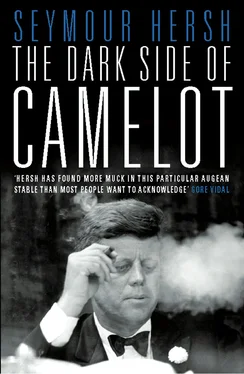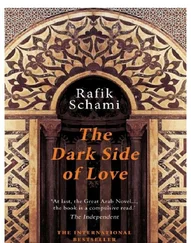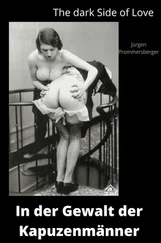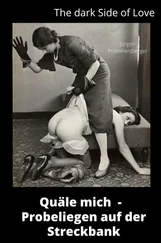SEYMOUR HERSH
The Dark Side of Camelot

For Elizabeth,
Matthew, Melissa,
and Joshua
Cover
Title Page
Dedication
1. November 22
2. Jack
3. Honey Fitz
4. Joe
5. The Ambassador
6. Taking on Fdr
7. Nomination for Sale
8. Threatened Candidacy
9. Lyndon
10. The Stolen Election
11. Campaign Secret
12. Trapping Nixon
13. Executive Action
14. Bay of Pigs
15. Secret Service
16. Crisis in Berlin
17. Target Castro
18. Judy
19. First Marriage
20. Missile Crisis
21. Deceptions
22. Ellen
23. Vietnam
24. Last Days
Epilogue
Chapter Notes
Index
Acknowledgments
About the Author
Author’s Note
Also by the Author
Copyright
About the Publisher
It was America’s blackest Friday.
President John F. Kennedy was gunned down on a Dallas street thirty minutes after noon on November 22, 1963. Vice President Lyndon B. Johnson, who had accompanied the president to Dallas, sped back to Air Force One and was sworn in with the bloodied widow of Jack Kennedy at his side. The presidential airplane soared away from murderous Texas to the safety of Washington.
Once Air Force One was airborne, some of the military and security men on duty were able to emerge from their despair and anger to begin asking necessary questions. Was Jack Kennedy’s death the first move in an international conspiracy? Was Lyndon Johnson now the target? These concerns were shared in Washington, as the bureaucracy began the slow turn from one presidential orbit to another.
But it was the man closest to John F. Kennedy who needed to put aside his grief and begin immediately to hide all evidence of Kennedy’s secret life from the nation—as well as from the new president, who could be sitting in the Oval Office by early evening. When word came of his brother’s shooting, Attorney General Robert F. Kennedy, the second most powerful man in Washington, was at his Hickory Hill estate in suburban Virginia having a casual lunch of clam chowder and tuna fish sandwiches with, among others, Robert Morgenthau, the U.S. attorney for the Southern District of New York. *
In those first hours of horror, the president’s remarkable younger brother lived up to his reputation for pragmatism and toughness, notifying members of the family, worrying about the return of his brother’s body, answering legal queries from the new president, and, it seemed, losing himself in appropriate action. There would be time for mourning later. Now there was a state funeral to arrange and the president’s widow and children to console. Among his many telephone calls early that afternoon was one to McGeorge Bundy, the dead president’s national security adviser, who was told to protect Jack Kennedy’s papers. Bundy, after checking with the State Department, ordered that the combinations to the president’s locked files be changed at once—before Lyndon Johnson’s men could begin rummaging through them.
Bobby Kennedy understood that public revelation of the materials in his brother’s White House files would forever destroy Jack Kennedy’s reputation as president, and his own as attorney general. He had spent nearly three years in a confounding situation—as guardian of the nation’s laws, as his brother’s secret operative in foreign crises, and as personal watchdog for an older brother who reveled in personal excess and recklessness.
The two brothers had lied in their denials to newspapermen and the public about Jack Kennedy’s long-rumored first marriage to a Palm Beach socialite named Durie Malcolm. In 1947 Kennedy, then a first-term congressman, and Malcolm were married by a justice of the peace in an early-morning ceremony at Palm Beach. In an interview for this book, Charles Spalding, one of Kennedy’s oldest friends, broke five decades of silence by family and friends and confirmed his personal knowledge of the marriage. “I remember saying to Jack at the time of the marriage,” Spalding told me, “‘You must be nuts. You’re running for president and you’re running around getting married.’” The marriage flew apart. Spalding added that he and a local attorney visited the Palm Beach courthouse a few days later and removed all of the wedding documents. “It was Jack,” Spalding recalled, “who asked me if I’d go get the papers.” No evidence of a divorce could be found during research for this book.
The president’s files would reveal that Jack and Bobby Kennedy were more than merely informed about the CIA’s assassination plotting against Prime Minister Fidel Castro of Cuba: they were its strongest advocates. The necessity of Castro’s death became a presidential obsession after the disastrous failure of the Bay of Pigs invasion in April 1961, and remained an obsession to the end. White House files also dealt with three foreign leaders who were murdered during Kennedy’s thousand days in the presidency—Patrice Lumumba, of the Congo; Rafael Trujillo, of the Dominican Republic; and Ngo Dinh Diem, of South Vietnam. Jack Kennedy knew of and endorsed the CIA’s assassination plotting against Lumumba and Trujillo before his inauguration on January 20, 1961. He was much more active in the fall of 1963, when a brutal coup d’état in Saigon resulted in Diem’s murder. Two months before the coup, Kennedy summoned air force general Edward G. Lansdale, a former CIA operative who had been involved in the administration’s assassination plotting against Fidel Castro, and asked whether he would return to Saigon and help if the president decided he had to “get rid” of Diem. “Mr. President,” Lansdale responded, “I couldn’t do that.” The plot went forward. None of this would be revealed until this book, and none of it was shared with Lyndon Johnson, then the vice president.
The vice president also did not know that Jack Kennedy’s acclaimed triumph in the Cuban missile crisis of October 1962 was far from a victory. The world would emerge from fearful days of pending nuclear holocaust and be told that the president had stood firm before a Soviet threat and forced Premier Nikita Khrushchev to back down. Little of this was true, as Bobby Kennedy knew. Knowing that their political futures were at stake, the brothers had been forced to negotiate a secret last-minute compromise with the Soviets. The real settlement—and the true import of the missile crisis—remained a state secret for more than twenty-five years.
There were more secrets for Bobby Kennedy to hide.
In the last months of the Eisenhower administration, a notorious Chicago gangster named Sam Giancana had been brought into the Castro assassination effort, with Senator Jack Kennedy’s knowledge. But Giancana was far more than just another mobster doing a favor for the government—and looking for a favor in return. Giancana and his fellow hoodlums in Chicago, one of the most powerful organized crime operations in the nation, had already been enlisted on behalf of Kennedy in the 1960 presidential campaign against Republican Richard M. Nixon, providing money and union support; mob support would help Kennedy win in Illinois and in at least four other states where the Kennedy plurality was narrow. Giancana’s intervention had been arranged with the aid of both Frank Sinatra, who was close to the mob and the Kennedy family, and a prominent Chicago judge, who served as an intermediary for a meeting, not revealed until this book, between the gangster and Jack Kennedy’s millionaire father, the relentlessly ambitious Joseph P. Kennedy. The meeting took place in the winter before the election in the judge’s chambers. A few months after the election, allegations of vote fraud in Illinois were reported to Bobby Kennedy’s Justice Department—and met with no response. The 1960 presidential election was stolen.
Читать дальше













